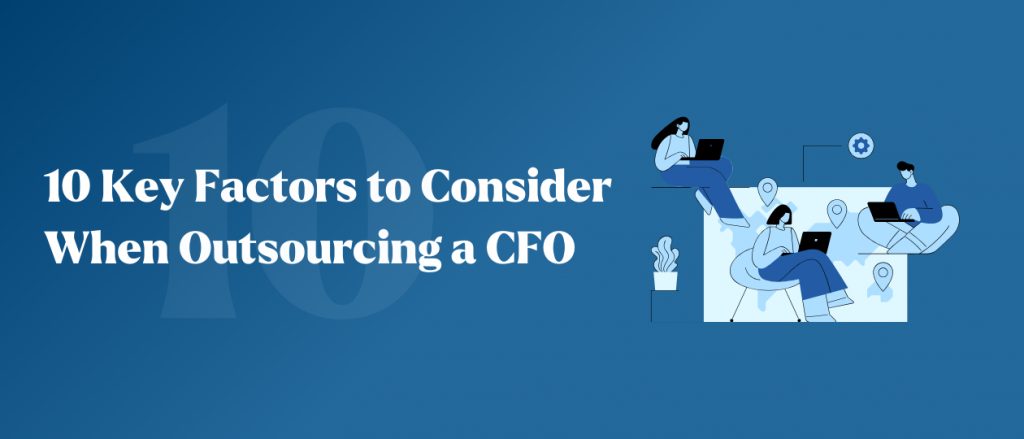
Top 10 Key Factors to Consider When outsourced CFO
Outsourcing a Chief Financial Officer (CFO) is a strategic move for businesses that require high-level financial expertise without the commitment of a full-time hire. Whether you’re a startup looking for fundraising guidance or an established company streamlining operations, choosing the right outsourced CFO is crucial.
Below are ten key considerations to ensure a successful engagement.
1. Clarify Your Objectives:
Before engaging an outsourced CFO, clearly define your financial goals. Are you looking for fundraising assistance, financial strategy, cash flow management, or operational efficiency? Understanding your needs will help in selecting the right expertise to align with your company’s objectives.
2. Verify Experience & Expertise:
Unlike CPAs or financial analysts, there is no certification for CFOs. This makes vetting their experience even more critical. Look for candidates with a proven track record in handling challenges similar to yours. Ask for real examples and case studies demonstrating their ability to solve financial issues relevant to your business.
3. Assess Industry & Business Stage Experience:
CFOs experienced in early-stage startups may not be ideal for mid-size or enterprise businesses, and vice versa. Similarly, private and public companies have different financial needs. Choose a CFO who has successfully navigated similar business stages and challenges.
4. Individual Consultant vs. VCFO:
There are two main options: hiring an independent CFO consultant or engaging a firm that provides Virtual CFO services. An individual consultant may offer niche expertise, while a firm provides a broader range of professionals and backup resources. Firms also ensure continuity in case personnel changes are required.
5. Conduct Reference Checks:
Speaking directly with previous clients or employers can provide valuable insights into a CFO’s capabilities, communication style, and reliability. Ask references about their experience, problem-solving approach, and how they handled financial challenges similar to yours.
6. Consider Networking & Additional Resources:
A well-connected CFO can introduce you to funding sources, investors, service providers, and industry experts. If networking and access to additional financial resources are essential to your business, evaluate their connections and past success in leveraging industry relationships.
7. Document the Engagement Terms:
A well-defined agreement ensures transparency regarding deliverables, timelines, fees, and expectations. A CFO firm will typically provide a Master Services Agreement, including work-related insurance, while an independent consultant may require a customized contract outlining their role and obligations.
8. Work Model & Flexibility:
Determine whether the CFO will work on-site, remotely, or in a hybrid model. Post-pandemic, many professionals prefer remote work, but in-person engagement may be crucial for your business. Ensure the CFO’s work model aligns with your expectations and operational needs.
9. Ongoing Professional Development & Market Awareness:
A high-quality CFO stays updated on changing market conditions, regulations, and best practices. Ask about their ongoing training, and certifications, and how they keep up with industry trends. Firms often provide internal training, while independent CFOs should demonstrate continuous learning efforts.
10. Additional Support Beyond CFO Duties:
Some firms offer additional expertise beyond CFO services, including financial controllers, HR executives, or tax specialists. If you foresee needing cross-functional financial support, consider a firm that provides access to these services.
Conclusion
Choosing the right outsourced CFO can be a game-changer for your business. By thoroughly evaluating the above factors, you can ensure a productive engagement that supports your company’s financial health and growth. Take the time to vet candidates properly, establish clear expectations, and align their expertise with your business needs for long-term success.